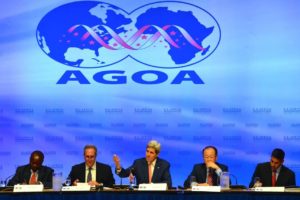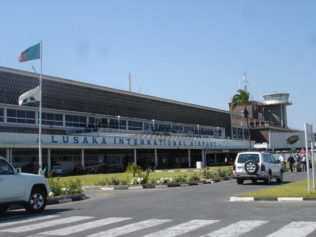
Wikimedia Commons
What will trade with Africa look like under a Trump presidency? African leaders are concerned that the African Growth and Opportunity Act, or AGOA, will be on the chopping block under Trump and that the continent itself will not be a priority. The AGOA was enacted by Congress in 2000 and signed into law by President Clinton. It allows sub-Saharan African countries to export thousands of goods to the U.S. on a duty-free basis. The act, which has enjoyed bipartisan support, “offers tangible incentives for African countries to continue their efforts to open their economies and build free markets,” according to the International Trade Administration.
Nations must make progress in improving their rule of law, human rights and labor standards to qualify for membership in the AGOA, which expires in 2025.
As OZY reported, the little-known trade agreement may face its demise because of its nonreciprocal nature. AGOA is a nonreciprocal agreement that does not extend tax breaks to U.S. businesses that export to African nations. In fact, because the agreement was never meant to be beneficial to the U.S., the Trump White House could review AGOA and determine it is disadvantageous to the country. Also raising concerns are the questions asked by the Trump transition team concerning African policy, according to The New York Times: “With so much corruption in Africa, how much of our funding is stolen? Why should we spend these funds on Africa when we are suffering here in the U.S.?”
Experts in sub-Saharan Africa predict the Trump administration spells bad news for the region, as the president, seeking to make America great again, might want unrestricted access to other countries without reciprocity. “The United States under Trump would certainly want to be the winner in all trade deals here, which would be unfair,” Kingston Nyakurukwa, an independent Zimbabwean economist told IDN. “Unlike the Obama administration, which believed that it had to maintain a degree of responsibility for assisting development in other states, particularly here in Zambia, President Trump has shown no sign that he will care an inch for development, even here in Southern Africa and so with President Trump at the helm of U.S. politics, I have to say that U.S. development assistance to us here in Southern Africa will also be affected, if not become minimal,” Zambian civil society activist Hachikoko Namwanga told IDN.
Despite uncertainty over the future of AGOA, the agreement has benefited both the U.S. and sub-Saharan nations. According to the Brookings Institution, AGOA has created 300,000 jobs in Africa, which has helped the continent emerge as one of the fastest-growing regions in the world. Data from the United States International Trade Commission and United States Department of Commerce reveals the act is responsible for $6.4 billion in vehicles from South Africa, $3.7 billion in oil from Nigeria, $2.7 billion in oil from Angola, $736 million in oil to Chad and $506 million in textiles from Chad. Further, the U.S. Trade Representative has found that the agreement supports 120,000 U.S. jobs, primarily machinery manufacturers such as John Deere and Caterpillar, and companies that manufacture inputs for oil production.
As The Hill reported, foreign assistance initiatives such as AGOA are a small part of the U.S. budget, yet go a long way in stabilizing fragile regions in the world and demonstrating American humanitarian values and compassion.
Despite its benefits, AGOA has its critics. For example, the East African Community has sought a long-term preferential trade agreement that removes the uncertainties of AGOA. “For EAC partner states to expand their trade partnership with the U.S. market, there has to be a reciprocal free trade agreement like the one with the European Union,” Peter Kiguta, EAC Director General of Customs and Trade told Daily Monitor. “The challenge with AGOA is that it is unilateral; it can be withdrawn anytime and the 10-year period is very short and limiting for trade. So, we need to have a long-term trade partnership that is more predictable,” he added. In addition, as a unilateral measure, AGOA was enacted without input from African nations, which perpetuates the image of paternalism from the American donor state.
Compounding matters is that the AGOA can amount to a coercive agreement for African nations, according to Foreign Policy in Focus. The U.S. president may reevaluate each nation’s eligibility on an annual basis and requires stringent conditions such as “a market-based economy that protects private property rights” and the elimination of all tariff protections, undermining local economies by making African markets susceptible to a flood of foreign goods.
Ricardo Reboredo of Trinity College Dublin wrote in The Conversation that, given the highly militarized nature of the U.S. presence in Africa, this can only increase under the security-conscious policies of a Trump administration. Detractors contend the $36-billion trade deal mostly benefits foreign entrepreneurs, primarily of Chinese origin, with the AGOA “used as a back door to get Chinese goods into the U.S.” Despite this critique, thousands of Africans are employed through the act, which also encourages technology and skills transfer, which Reboredo says contributes to local economic growth.
Another criticism of AGOA is that only a handful of the 40 participant nations benefit from the act, especially when oil is not factored into the equation, according to OZY. In fact, The Hill found that energy-related products account for 67 percent of all imports to the U.S. under the agreement. In addition, the AGOA provides a good starting point but does not go far enough to bolster African economies, which is the original goal of AGOA. “Tariffs were a problem, but the reason African economies are not competitive is they lack the infrastructure, etc., to compete,” Todd Moss, senior fellow at the Center for Global Development, told OZY. Moss said that trade agreements are but one part of the total picture. It is arguably unlikely the U.S. will abandon the agreement, given that Secretary of State Rex Tillerson has experience in Africa, and half of the CEOs in Trump’s Strategy and Policy Forum operate on the continent.
Speaking at a Brookings forum on AGOA in 2012, President Bill Clinton said, “No country can work itself out of poverty with aid alone.” In Africa, the European Union has bilateral trade agreements, China has massive expansion and infrastructure projects in 35 African nations and India and Brazil have grown in influence on the continent. The U.S. has much room for improvement in achieving real, sustained bilateral trade deals with Africa.


